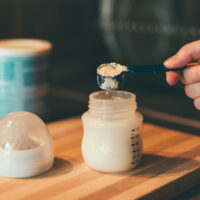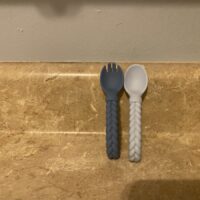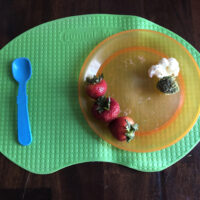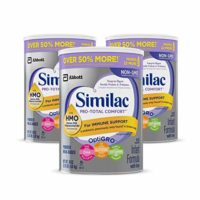We have researched and reviewed baby cereals and more than 20 baby formulas, so we’ve developed a lot of experience in finding food for your baby that is safe, healthy, and yummy! Our top choice no matter your baby’s age is the Happy Baby Organic Clearly Crafted Oatmeal Cereal because of the nutritional components, the benefits of oatmeal as the base grain, and for what is NOT in this cereal.
Best Baby Cereals
Happy Baby Organics Oatmeal Baby Cereal is a single grain cereal perfect as a first food choice for your new eater; whereas Earth’s Best Organic Infant Cereal is a multigrain cereal that is a better choice for an older, more active baby.
Happy Baby Organic Clearly Crafted Oatmeal Cereal
Best Baby Cereal for Beginning Solids (4 to 6 months)
For years, everyone from doctors to Grandma’s recommended that you start with plain rice cereal. In light of recent evidence against rice cereal, the experts now suggest that you simply feed baby food that’s easy to digest and contains good amounts of iron. That’s why a single-grain cereal is the best choice for a first food, and my favorite single grain cereal is this Oatmeal Baby Cereal by Happy Baby.
Why Oatmeal?
I like oatmeal because it’s a little bit more hearty than rice cereal. You can make it thicker, which is nice for babies with a bit of reflux because they’ll be able to keep it down more easily.
This particular oatmeal offers a nice silky smooth and fluffy texture and it mixes really well. You can use both breast milk and water and get great results with both.
Oatmeal offers more nutrition than rice cereal does. It’s not a white carb like most cereals, it’s a complex carbohydrate. This gives your baby the advantage of prolonged energy and feeling full for longer. Getting used to these kinds of carbs from the start sets them up for healthier choices later on.
The Right Nutrients for Smaller Babies
When it comes to food at such a young age, it’s all about nutrition. Taste isn’t as important as nourishing a baby’s body. This organic oatmeal baby cereal is not short on nutrients, and the taste isn’t too bad, either! In addition to protein and fiber, here’s the best of the best nutrients in this cereal:
- Iron: One serving of Happy Baby Oatmeal has 45% of the daily recommended value for iron. This is more than the 40% that most other baby cereals have. This nutrient is essential for brain development and is in short supply in breast milk, making this an ideal choice for breastfeeding moms.
- Fiber: 1 gram of dietary fiber will keep baby from becoming constipated or bloated, which is something that is pretty common when your baby first starts eating cereals.
- Protein: Protein is so important during the first year. It helps to make up the structure of our whole body, from cells to big muscles. This oatmeal has 2 grams of protein in one serving, so it accounts for 17% of baby’s need.
- Carbs: One serving of Happy Baby Oatmeal has 9 grams of carbs, which equals 9 grams of pure growing energy for your little one.
What They’ve Left Out
This brand will always be one of my favorites, and their baby cereal is no exception. Happy Baby puts real thought into their food. You won’t find any GMOs in this cereal. The resealable pack is totally free from nasty chemicals like BPA.
As for the food itself, there are no added salts, sugars, colors, or artificial flavors. It’s also gluten- and dairy-free, so it’s allergy-friendly.
In fact, there are only 3 ingredients on the back of this cereal. That means that it’s going to be pure and gentle on a little tummy that’s just getting started in the world of real food.
You’re left with nothing but milled oats and some awesome nutrients. And while it’s not the most flavorful thing you could make, it’s a good starting point for baby’s first food. You can confidently feed this wonderful food to your baby every day!
Video: Why It’s Healthy
Gerber Baby Cereal Organic Rice Cereal
Best for Beginning Solids (4 to 6 months)
What would a baby cereal review be without a glimpse at Gerber baby food? This stuff has been a staple in many households for generations. While some people shy away from single grain rice cereal due to arsenic concerns (see note at the end), some people rely on a very easy-to-digest grain like white rice. If you want a simple option to start your baby on, then Gerber is a great, affordable baby cereal option.
White Rice Can Be Nice
Now, I am saying this knowing full well what the other options are, but for some babies, white rice is the best choice. Putting all of the controversy surrounding the nutrition, white rice is really easy to digest. Yes, it’s bland. Yes, it’s not the most nutritious grain out there. But for babies that just need help keeping something down, white rice is a great choice. It’s very gentle on little tummies and it’s not likely to cause an allergic reaction. This particular cereal is organic and tested for arsenic levels, so arsenic contamination isn’t as big of a concern.
Basic Nutrition
This is a good option for your baby’s very, very first solid food. Mixed with a little breast milk, formula, or water, it offers great nutrition for a 4- to 6-month-old baby.
- Iron: One serving of this cereal gives baby 45% of their daily iron need. That’s important as baby begins to look to solid foods to fulfill those iron needs.
- VitaBlocks Blend: This is Gerber’s exclusive blend of Vitamin C, Vitamin E, Zinc, and 6 B Vitamins. Each of these vitamins will promote the healthy growth of all your baby’s body systems, including the immune system.
- Calcium: What better time to get calcium than when bones and teeth are growing like crazy! This cereal has 25% of your baby’s suggested calcium intake. As we all know, babies need calcium to help them build strong bones and teeth.
- Zinc: Not getting enough zinc can lead to stunted growth in children. This nutrient is essential for the growth and function of the immune system as well. Babies get 30% of their daily intake from this cereal.
- Choline: This nutrient supports brain and eye health. Since this nutrient is so important to natural processes in the brain, it makes a good supplement to baby cereals. There is 15mg of choline in each serving of organic Gerber cereal gives your baby’s brain a boost.
A Good, Not Great Choice
I love that this cereal is organic. It’s also non-GMO, has zero salts, and zero added sugars. So now that the scary stuff is gone, we can focus on taste and texture. This is bland, bland, bland! A baby with an adventurous palate will probably reject this unless you add some flavor with some fruit or veggies. The texture is okay, not as fine as other rice cereals, but dissolves without too much problem. I’ve learned that letting the rice cereal sit in the liquid for a few minutes gives a smoother finished product. As with all rice cereals, take care of the back-up, aka cereal-induced constipation!
8x Organic Carrot Quinoa Infant & Baby Cereal
Best for Beginning Solids (4 to 6 months)
The 8x Organic Carrot Quinoa Infant & Baby Cereal isn’t well known, but that doesn’t mean that it’s not well made. I will admit that this stuff is pricey, so it’s probably best suited for a baby that only eats rice cereal once a day or so. The price, combined with the nutritional profile, makes this cereal an amazing choice for a first food for your little one.
Quinoa: The Grainy Breast Milk Equivalent
Quinoa has all essential and nonessential amino acids, proteins, vitamins, iron, and is a real-life superfood. This makes it an ideal first (and forever!) food for your baby. I can’t sing quinoa’s praises enough. It’s like the perfect addition to a breastfed baby’s diet because it mimics what they’ve already been getting. Plus, it’s a perfect starter grain because it’s hypoallergenic and gluten-free, so it won’t rock your tiny baby’s tummy.
Outstanding Nutrition
This grainy cereal from WutsupBaby has it all, and the addition of carrot only makes the whole thing healthier.
- Omega Fatty Acids: This cereal has omega-3s, -6s, and -9s. These play an important role in brain and eye development and support cellular function as well.
- Prebiotics and Fiber: Nothing has to be added to this cereal to give it better digestibility. The drum dehydration of the quinoa retains the grain’s natural prebiotics and fiber. This makes it easily absorbed and less likely to cause constipation.
- Protein: Quinoa is a complete protein, so it’ll help support the muscles and organs of your growing baby.
- Vitamins and Trace Minerals: Let’s not forget the good stuff! This cereal is a good source of Vitamins A, B, and E in this cereal, as well as magnesium and zinc.
Nothing Added, Nothing Lost
So this cereal has 2 ingredients: quinoa and carrots. Both are non-GMO and organic. There are no artificial flavors, colors, or preservatives. There are no salts, no sugars, and nothing to get in the way of a simple, and nutritious food. Now, the carrots do add a bit of flavor, so be prepared for that. It’s not as bland as other cereals. And the texture is very fine and powder-like, which I personally love for rice cereal. Fewer lumps mean a happier baby.
The big downside here: the price! It’s only available in these travel packs. They’re convenient, but they are expensive. Not a good choice for a baby who likes to down a bunch of cereal.
Grain Brain Organic Quinoa Flakes
Older babies simply have different nutritional needs than younger babies. From the time that baby is ready to start solids, to the time they get really good at eating solids, they will be needing different foods to both fill them up and nourish them. Older babies depend more on food than milk for their nutrient intake. When single grain cereal becomes bland, and the baby’s food repertoire becomes larger, this quinoa-based baby cereal is fantastic.
Super Grain for Super Growth
Quinoa has been known as a superfood for centuries. It’s always been known to be nutritionally dense. Babies, in particular, can benefit from this grain, as it is a complete protein on its own. It has all the essential and nonessential amino acids that are the important building blocks for our bodies, and especially our muscles and brain.
It actually has a nutritional profile that’s similar to breast milk, so it gives your baby exactly what they need as they get older. That makes it a really great food during weaning. You’ll know that your baby is getting similar nutrition without having to continue nursing or bottle feeding.
The organic quinoa in this cereal offers 100% plant-based nutrition for your baby. The lack of synthetic nutrients is what causes the cereal to be so easily digestible. Plus, it has a plant fiber that acts as an active prebiotic, which also helps with digesting this grain.
Natural Nutrition
Plant-based nutrients are more easily absorbed by your baby, too. So even though quinoa seems sophisticated for your baby, it’s actually an ideal food for older babies.
While organic royal quinoa flakes is the only ingredient, that doesn’t mean that this cereal falls short on nutrition. Here are some other great things that can be found in this cereal:
- Iron: This cereal contains a natural source of iron — 17% in fact.
- Fiber: This grain has more fiber than most other single grains. Important for babies that might have issues with constipation from eating solid foods.
- Vitamins and Minerals: You’ll find minerals like magnesium, zinc, and calcium in this cereal. And none of them are synthetic.
- No allergens!: This cereal is free from gluten, dairy, soy, and egg. So while I like it for older babies, it could be a good food earlier on, too.
If you’d like to avoid rice or oatmeal cereals, or just want to try something new, this Grain Brain baby cereal is a great alternative!
Earth’s Best Organic Infant Cereal
Best for Older Babies (4 months and up)
We’ve talked about how more advanced and complex grains are great for an older baby’s palate and diet. Well, this multigrain cereal is not short on any grains, texture, or flavor. Even though it’s more complex, it’s still very easy for baby to digest. It still has a finer texture too, so it’s easy to mix into just about anything. A great choice for a baby cereal-eating pro.
Many Grains Make Happy the Baby
This baby cereal is a mix of oats, spelt (a type of hulled wheat), and barley. Oats alone are an easy-to-digest, complex carbohydrate. Add in an ancient wheat grain called spelt, which is like a healthier, nuttier tasting wheat grain, and good old barley and you have a great mix. All three of these are high in fiber, which should offset the added iron’s ability to make baby constipated. All three of these are hearty and will fill up an older child, no problem.
Nutrition for Your Almost-Toddler
This cereal has really important nutrients that an older, more active baby would need to fuel their day.
- Zinc: This wonderful mineral helps your body’s immune system. It helps build proteins and DNA, so it’s crucial when baby is growing so quickly. This has 25% of need daily zinc.
- 6 B Vitamins: These vitamins support the nervous system, but more importantly, they are used to help convert food to energy, something your toddling baby needs! You’ll find 25% of each B vitamin’s recommended daily intake in Earth’s Best.
- Iron: Without enough iron, your blood cells just can’t do what they need to do. Iron deficiency can stunt growth and keep baby from reaching his or her next milestone. 45% of daily iron needs can be met with just one serving of cereal.
- Protein: 2 grams of protein doesn’t seem like much, but that’s actually 9% of baby’s daily needs. That will help their muscles and body grow.
Best for Earth and Baby
One of the big benefits of using Earth’s Best baby cereal is the fact that it really is good for baby. They add all the nutrients that tots need without adding any preservatives, salt, sugar, flavoring, or colors. This baby cereal is best for the earth, too. It isn’t made using controversial GMOs and it’s completely organic. No pesticides to harm the environment or your growing child. That means it’s good for everyone, including you. You can get this all at a reasonable price and you can rest assured that your baby will like the flavor and thicker texture and heartier flavor.
Baby Cereal Comparison
The table below compares only the recommended products on this page. A low or high Price means it is low or high compared to the other products listed. The Popularity Score reflects how often readers click on and buy the product. The Quality Score is our assessment of the overall performance and satisfaction with the product compared to others in the table.
| Earth's Best Organic Infant Cereal | 9.8 | 8.8 | 42.72 |
| Gerber Baby Cereal Organic Rice Cereal | 9.9 | 9.2 | 23.64 |
| Grain Brain Organic Quinoa Flakes | 3.9 | 9.0 | 14.99 |
| 8x Organic Carrot Quinoa Infant & Baby Cereal | 5.7 | 7.8 | - |
| Happy Baby Organic Clearly Crafted Oatmeal Cereal | 8.6 | 9.4 | - |
A Note About Rice Cereal
Now that I have revealed my picks for my favorite baby cereals, I want to talk about why rice cereal only made the list one time. Maybe you’ve heard about the arsenic concerns for baby cereals. Arsenic occurs when crops grow because it is absorbed from the irrigation water used to grow crops. All rice contains some arsenic, and the level of arsenic in the rice will depend on the arsenic levels of the ground and water where it is grown.
Rice crops take a lot of water and therefore absorbs a lot of the inorganic arsenic that’s been accumulating in the ground and water.
Arsenic found in baby cereal is dangerous because it can have a negative impact on the central nervous system, including the brain and nerves. It can even cause learning difficulties later in life.
According to a study in 2016, just 3 servings of baby cereal increase arsenic exposure in infants. No parent wants to inadvertently do that to their kid.
Organic and non-GMO baby cereals made from other grains pose no such risk. That’s why I shy away from inorganic white rice cereal.
FAQs – Baby Cereal
What cereal, other than rice, should I give my baby?
Experienced Mommy recommends oats, quinoa, barley, and even multi-grain cereal. The type of cereal that you feed your baby will depend on their age and their ability to chew and digest foods. Multi-grain or more complex grain options are usually better for older babies, while single grains (like rice or oatmeal) are better for younger babies.
Is rice cereal dangerous for babies?
Maybe, if it makes up the base of your baby’s diet. See the above note for info on how arsenic gets into rice cereal.
Measures are being taken to help protect our babies from too-high levels of arsenic. Gerber, for example, stated in 2017 that all of its cereals were tested and found to be within FDA regulations on arsenic.
Rice has its advantages in that it is gluten-free and easy to digest, but you shouldn’t feed rice cereal to your baby more than once a day in order to minimize arsenic exposure.
Can I mix banana with rice cereal?
This can be a fabulous meal for baby!
Rice cereal and banana are a great travel breakfast for an older baby who has learned to eat some solids. Mash a ripe banana and a little rice cereal together with a fork until you have a smooth mixture, and feed the mixture to your baby with a spoon. Provide a sippy cup of milk or water to go with, and you have a wholesome meal for an older baby.
One thing to be wary of is constipation. Banana and rice can both slow down digestion and lead to constipation, so if your baby is sensitive to that, you may want to do rice cereal with applesauce, or maybe a banana with some oatmeal.
How long do babies eat rice cereal?
The answer to this question is quite variable, especially from baby to baby.
Your child needs good nutrition, and if he can get the right nutrients without the addition of baby cereal, then there’s no need to continue feeding the cereal.
If your breastfed baby does not have another good source of iron in their diet, you should stick with some iron-fortified cereal to help them meet their daily iron need.
In general, babies can taper off baby food at around 12 months and go to regular food, but that depends on many things, like the emergence of teeth and the ability to grasp and chew finger foods.
When can I start putting rice cereal in my baby’s bottle?
Around 5 to 6 months old is when most people begin feeding rice cereal.
Before you add anything to your baby’s bottle, check with your baby’s doctor. It’s a common misconception that adding rice cereal to a bottle will help your baby to sleep longer or eat less often. Usually, only babies with reflux or other issues require bottle thickening.
If your baby is ready to try solids a la rice cereal, spoon-feed them a runny mixture of cereal and formula or breastmilk instead. That way, they can get used to the idea of eating from a spoon.
Is it OK to give rice cereal at night?
Again, it’s a common misconception that rice cereal in a bottle will help baby sleep.
There’s no evidence to support that claim, but there is evidence to show that adding rice cereal to a bottle can have adverse effects, like adding stress to an underdeveloped digestive system and contributing to overeating, which leads to discomfort and less sleep! That’s why the American Academy of Pediatrics advises against it unless your doctor says otherwise.
It is totally fine to include rice cereal as your baby’s evening meal, though! Just feed it to them sitting up and with a spoon, as part of your normal dinner routine.
Can I skip rice cereal and go straight to baby food?
Absolutely! My kids always tried banana or avocado first, and baby cereal was added once they got eating these foods down pat.
The reason that rice cereal is often pushed on parents is that breastfed babies need additional iron, and baby cereals claim to provide a good amount of iron, even though research shows iron is poorly absorbed from baby cereal compared to formula. Your baby can also get iron in baby foods made with meat, but they aren’t as palatable for your baby.
Just remember to introduce only one new food at a time, giving your baby a few days so that you can see how it affects him or her. And follow the sound advice of your doctor on whether your baby is ready for solids, and what solids you should feed them.











